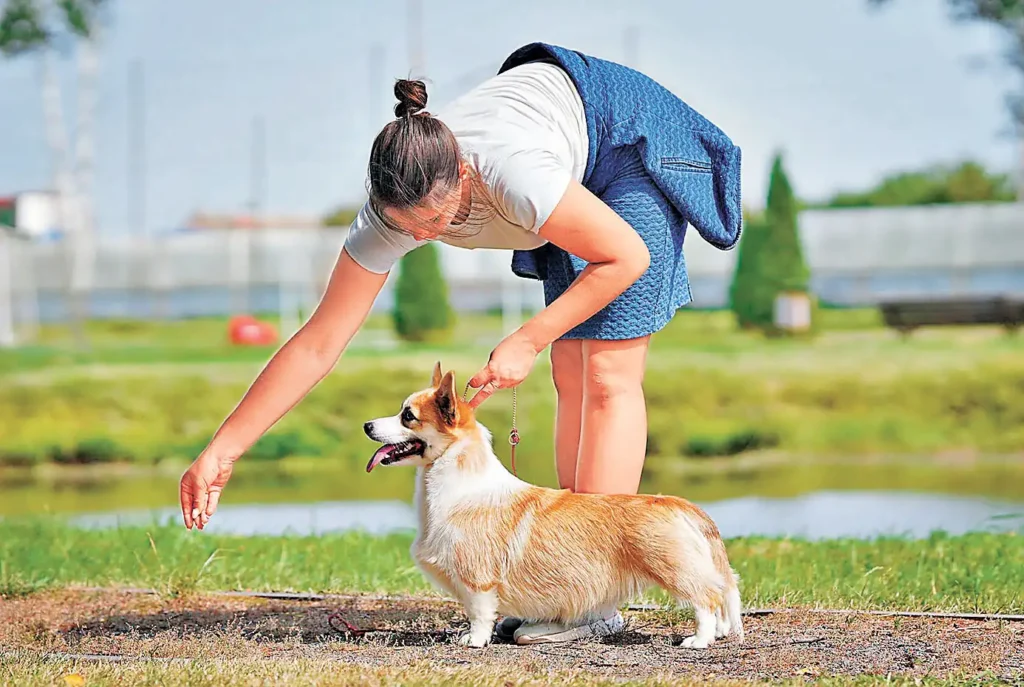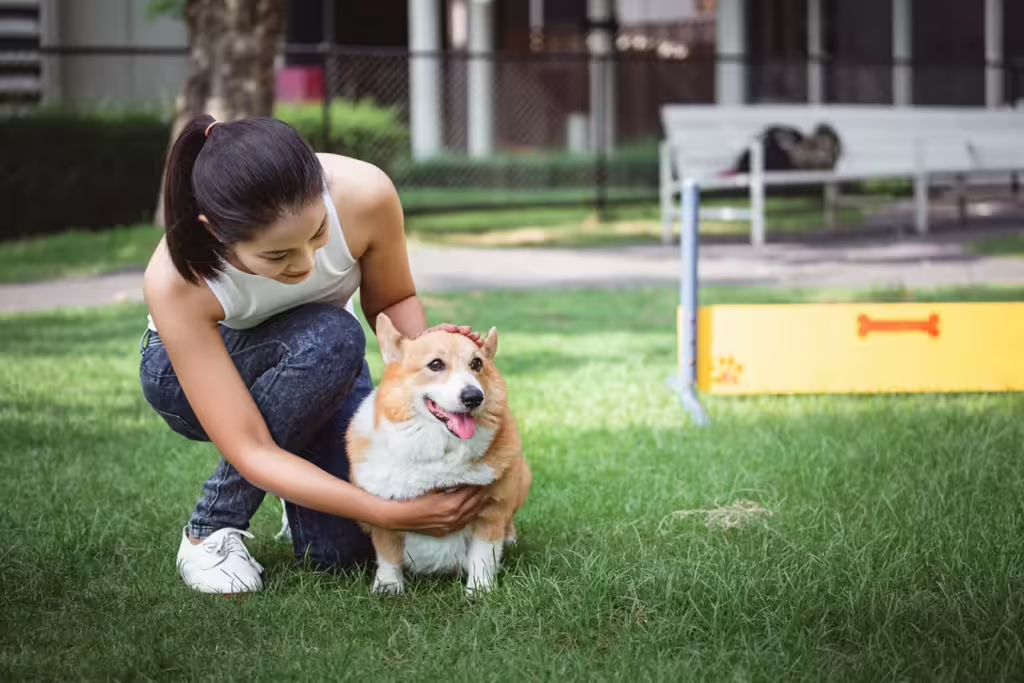When you think of Corgi, you and I will invariably think of “a pair of short legs wagging their asses as they walk along the road”, which is simply adorable! What you may not know is that Corgis suffer from health problems because of their short legs, and they are also good at shedding hair!
Is it a good idea to keep a Corgi? What do you need to pay attention to when raising a Corgi? This article will bring you an in-depth understanding of the five key points of care that owners must know before raising a Corgi!
Corgi Introduction

The Corgi, known as the “Welsh Corgi”, originated in Wales, England, and is a breed of sheepdog. Their short stature allowed them to move freely among cattle and sheep, making them a good herding companion in the early days.
Their signature “short legs” and “round ass”, “big innocent eyes and angelic smile” have made them a popular family dog in recent times! Even Queen Elizabeth II of the United Kingdom is obsessed with corgis.
Height and Weight of Corgi
The adult Corgi is about 25-30 centimeters tall and weighs about 10-14 kilograms. Most Corgis mature at one year of age, with a few delaying their development until two or three years of age.
Corgi Lifespan
The average life span of the Corgi is around 12-15 years, with the average Corgi reaching old age at around 8 years.
Corgi Personality
The Corgi is “gentle, stable and friendly” and is always willing to get close to people, and can quickly build up trust and affection with their owners.
Although they are small in size, they are “energetic” and “lively”. Their reaction speed is amazing, and they can quickly catch the changes around them, making them a highly alert dog.
As a type of sheepdog, the Corgi is very intelligent, agile and easy to train, and can quickly understand its owner’s commands as long as it is well-taught.
Are Corgis easy to breed? 5 Points to Note when Raising a Corgi

Point 1. Genetic Defects of Corgi
Although Corgi’s short legs are adorable, they are also the main reason why they suffer from joint and disc diseases.
Before keeping corgis, it is important to know about the diseases that are common in them.
Prevalent Problems 1. Intervertebral Disc Disease
Intervertebral disc disorders are mostly caused by genetic defects and are more common in dog breeds with “long bodies and short legs”.
Corgis with this gene have incomplete cartilage development.
If the dog jumps up and down, climbs stairs, or applies excessive force, the spine will be compressed for a long period of time, which will indirectly cause disc disease.
In the early stages of disc disease, the dog will feel back pain, and at that time they can still walk normally, but then they will experience “walking incoordination” and “weakness in the hind legs”.
If left unchecked, it may lead to inability to walk, paralysis of limbs, affecting urination and defecation, and in severe cases, even “paralysis”.
Prevalent Problems 2. Hip Dysplasia
Hip dysplasia is a very common skeletal disease in dogs, which refers to “misalignment of the leg bone and hip joint”, poor development of the hip and thigh muscles, and also prone to “degenerative arthritis”.
There are many causes, such as genetic predisposition, improper care, malnutrition, overweight or poor living environment.
Common symptoms include “difficulty in walking on the hind legs” and “unstable walking posture”, which may lead to “atrophy of the hind feet” in the long run, affecting the walking of the front feet, and even developing into arthritis.
If you find that your Corgi’s mobility has decreased and he no longer likes to jump up and down, you should be vigilant and seek medical attention as soon as possible.
If you want to prevent the above diseases that are more likely to be caused by the Corgi’s genetic defects, you can start with the following points:
Avoid inappropriate exercise: You should try to avoid letting your Corgi “stand for a long time, climb stairs, or jump up and down on high places,” as well as engage in intense exercise behavior, so as not to put too much burden on the spine and intervertebral discs.
Improve the living environment: Before raising a Corgi, owners should make sure that there is an elevator in their home apartment, and lay pet non-slip mats and set up pet stairs to reduce the impact of the dog’s regular activities on the joints.
Weight management: Owners should strictly control the Corgi’s dietary habits, in addition to ensuring balanced nutrition, but also to develop a good habit of taking the dog for regular “walks” to avoid the dog’s gluttony resulting in obesity, chronic diseases, joints and other problems of maldevelopment.
Point 2. Corgi’s “Health Problems
Health Note 1: Easy to get fat
Corgi is a relatively “greedy” dog, although the nature of love of food makes it easier for owners to train them.
However, eating too much will easily cause problems such as overweight and indigestion, and will also cause joints and discs to be burdened due to overweight.
Therefore, “diet control, regular exercise” habit is very important, owners use snacks as incentives to teach the dog, but also remember to grasp the amount!
Health Note 2: Gastrointestinal Sensitivity
Corgi’s gastrointestinal digestive function is relatively poor, can not let the dog love to eat what they eat, once eat too much, eat the wrong, will lead to indigestion.
Therefore, the diet should not only be “time and quantity”, but also pay attention to the nutritional balance of the food, too oily, too salty, difficult to digest the food should be avoided as much as possible.
Owners can also allow Corgi to consume pet probiotics to help the intestinal tract accumulate good bacteria to help digestion and maintain intestinal stability.
Health Note 3: Ear Cleaning
The Corgi’s large, fox-like ears are prone to retaining “grease” or getting stuck in dust and need to be cleaned regularly.
Owners can check their Corgi’s ears regularly to see if there is any odor, redness, discharge or signs of ear infections.
To clean, use a damp cotton ball or an ear cleaner designed for dogs and gently wipe the outer surface of the ear.
Do not insert cotton balls into the ear canal to avoid damaging your dog’s inner ear structure.
Point 3:Corgi’s Sharp Hearing
Corgi is originally a sheepdog, because of the herding need to “always be alert to the surrounding environment”, their hearing is also very “sensitive”, to the smallest sound will be reacted.
Therefore, loud noises such as firecrackers, fireworks, car sirens, thunder, etc. may make him feel scared and nervous.
At this time, he may bark more than once, so you can try your best to “divert his attention and be patient with him to give him a sense of security”.
It is difficult to change the Corgi’s nature, but owners can train their dogs to get used to normal “everyday noises” when they are puppies.
In order to reduce the emotional problems caused by “hearing sensitivity”.
Point 4: Corgi’s “active nature
Corgis are active by nature. Early on, when they worked in the pasture, they loved to bark, and their barks were loud, and their spirit and physical strength were very good.
Therefore, it is important to take your Corgi for “exercise” and “walks” at regular intervals.
If there is no space for them to move around and consume their physical strength, owners not only have to be careful of their “mischief” at home, but also cause “muscle atrophy and joint deterioration” in the long run.
Point 5: Corgi’s “Hair Change Disturbance
Different breeds of dogs have different levels of hair loss. Corgi is a short-haired dog, but its hair is quite “thick” and has “double-layered hair”.
In the dog’s hair loss list on the list, want to raise Corgi must be prepared to be “hair army” invasion of psychological preparation.
Corgi will go through its first moulting period when it is about four months old during puppyhood.
Owners should pay attention to the dog’s balanced diet, and also recommend “combing” the dog’s hair every day to help the new coat grow out smoothly.
Adult Corgis will go through a “seasonal” moulting period every year in response to changes in the environment and climate. In addition to paying attention to environmental cleanliness, helping your dog to get enough nutrition and eating less oily food will also help prevent hair loss.
How much does it cost to raise a Corgi?

Prices of Corgi are mainly affected by factors such as “purity”, “origin”, “bloodline”, etc. Prices usually range from NT$20,000 to NT$60,000(Taiwan Dollars) , depending on the seller and the quality of the dog.
Owners can choose to buy or adopt a Corgi from a pet store, a regular kennel, a pet farm or a professional breeding facility, which will usually provide a “health check”, “vaccinations” and some basic training for the dog.
Wherever you choose to buy a Corgi, make sure the seller is legitimate, responsible and can provide health records and proof of ownership.
Cost of keeping a Corgi for a year
Necessary Expenses
Food expenses: Main meals, fresh food, snacks, incentives, etc., about $1,500 to $3,000 per month, depending on the weight of the dog and the amount of food it eats.
Medical Expenses: Including vaccinations, deworming, check-ups, preventive medicine, health food, etc., about $2,000 to $5,000(Taiwan Dollars) per year, depending on your dog’s medical needs.
Insurance expenses: If you choose to purchase pet insurance, the premium will be around $2,000 to $5,000(Taiwan Dollars) per year.
Training Expenses: Dogs may attend training classes or socialization activities at a cost of $1,000 to $3,000(Taiwan Dollars) per year, depending on need.
Unforeseen medical expenses: such as emergency medical treatment or surgery, are more difficult to anticipate. It is advisable to keep a budget for unforeseen circumstances each year.
Non-Essential Expenses
Toys Rubber balls: chew toys, etc., about $1,000 to $1,500 per year, depending on frequency of purchase and type of toy.
Daily necessities: such as mattresses, collars, clothes, etc., about $1,000 to $2,000(Taiwan Dollars) per year, depending on need.
Bathing and Grooming: Includes grooming supplies, bathing and grooming services, approximately $3,000 to $5,000(Taiwan Dollars) per year, depending on the needs and frequency of the dog.
Travel and Pet Hotels: Owners who need to board their Corgi while traveling will incur an additional cost of approximately $1,000 to $3,000 per year, depending on the frequency of travel and choice of pet hotels.
The basic cost of keeping a Corgi may range from $30,000 to $50,000(Taiwan Dollars) per year. However, this is only a rough estimate and the actual cost depends on the needs of the owner and the dog.
Keeping a pet takes time, energy and money, so you should carefully consider whether you can afford it in your own life and financial situation before keeping a dog.
8 Frequently Asked Questions for Corgi Owners

Why do you need to cut Corgi’s tail?
Most people think of corgis as having short tails and rounded butts, but corgis, like most dogs, are born with long tails!
There are two main reasons for cutting off the tail:
In the early days, as a sheep herding dog, Corgi’s tails were trimmed short to avoid showing “emotions” or being “stepped on” by cows, so as to facilitate pasture work.
Corgi’s legs are relatively short, so a long tail dragging on the floor is likely to breed “bacteria”, and an overly heavy tail may also indirectly affect the health of the spine.
However, cutting off the tails of corgis also has its drawbacks: it is harder for them to maintain balance when running without their tails, and poor care after cutting off their tails may also lead to infections.
Therefore, more and more owners nowadays “choose to take good care of their dogs instead of cutting off their tails, so that their dogs’ tails can grow naturally”.
Are corgis clingy?
Corgis are affectionate by nature, and besides developing “trusting feelings” towards humans, as long as they like you, they will follow you wherever you go, even to the toilet!
If you leave him out of sight, he may even get angry, and even when he sleeps, he has to stay by your side.
If you hold another dog, he may be jealous or compete for your favor!
Does Corgi bite?
Corgis are a relatively “gentle” breed, and most of them will not bite as long as they are properly socialized and trained. However, like all dogs, they may exhibit biting behavior when they are afraid, hurt, or when they are trying to protect themselves, their home, or their belongings.
As puppies, Corgis tend to bite out of curiosity or because they are teething and need to “grind” their teeth to stop the itching.
Train your dog to “touch” other animals and the environment as early as possible to build confidence and develop basic obedience. Avoid exposing your dog to prolonged periods of anger or agitation, and ensure that it is well cared for, and you will be able to prevent your corgi from biting.
How many meals a day does a Corgi eat?
The frequency of feeding varies with the age of the Corgi. Adult Corgis should be fed 1-2 meals per day at regular intervals.
Puppy Corgis need to be fed more frequently, about 3-4 meals a day.
The best way to feed your Corgi is to follow your veterinarian’s advice and choose the appropriate frequency and amount of food according to your Corgi’s needs and body condition.
At what age does a Corgi become a adult dog?
Corgis are usually considered adults at one year of age.
At one year of age, most of them have reached the “mature stage” of growth and development, and have the physical and behavioral characteristics of an adult dog. A few Corgis will develop until they are two or three years old.
Despite their physical maturity, Corgis may continue to learn and grow until their behavior and personality traits stabilize.
What’s the size of a Corgi? Is it a small dog?
Many people are confused by the Corgi’s chunky size and are not sure if it is a medium-sized dog or a small dog.
Adult Corgis are about 25-30 cm tall and weigh about 10-14 kg. Small dogs are classified as “small dogs” because they are 40 cm tall and weigh less than 10 kg.
Do Corgis need air-conditioning in Summer? Are they afraid of the cold?
Corgi is a Shepherd Dog from Wales. It has a “double coat”, which consists of an inner coat that protects against the cold and an outer waterproof coat, making it a heat-shy breed.
In summer, you can turn on the air-conditioner or fan for the Corgi to provide a cool environment, pay attention to hydration, and try not to take it for a walk in the middle of the day to avoid “heat stroke”.
Though it is said that thick hair does not mean that it is not afraid of the cold, especially when the Corgi is a puppy, “resistance is poorer”, the hair is not yet complete, and the body functions are not yet mature, so it is still necessary to pay attention to keep warm in winter.
How many corgis are born in a litter?
Corgis can start breeding when they reach adulthood, i.e. after one year of age. Corgis usually have 4-6 babies in a litter.
